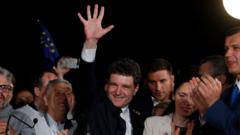As Romania elects Nicusor Dan, a mathematician and former mayor, the country grapples with deep divisions. His victory reflects a widespread desire for change, although many voters remain skeptical about his ability to unify a nation torn between traditional values and a modern European agenda.
Romania's New Leader Faces Divided Nation Amidst Calls for Change

Romania's New Leader Faces Divided Nation Amidst Calls for Change
Nicusor Dan's presidency signals a shift from extremism, yet challenges loom in a politically fragmented Romania.
Romania has ushered in a new chapter with the election of Nicusor Dan, a mathematician who now occupies the presidency. Known affectionately as "Nicky," Dan's rise marks a surprisingly quiet yet significant shift in the country's political landscape. After securing victory on the heels of an urgent call for change, Dan returned to routine, picking up his daughter from school, promising continuity to his family while signaling potential upheaval for the nation.
The election served as a platform for Romanians to voice their frustrations with the longstanding political elites that have governed the country for over thirty years. Although Dan is known primarily as the mayor of Bucharest, his selection is seen as a collective rejection of nationalist sentiments propagated by his opponent, George Simion. Simion, an outspoken Eurosceptic with controversial views, appealed to a segment of the population demanding change but ultimately failed to secure the presidency.
Political expert Radu Magdin emphasized the significance of voter turnout, which soared in reaction to fears of an extreme rightward shift represented by Simion. This illustrates a complex dichotomy in Romanian society, balancing a call for progress with deep-seated fears of regression. While some voters gravitate toward Simion's appeals to nationalism and traditional values, Dan's victory reflects a broader desire for stability and continuity within the European framework.
Supporters of Simion exhibited fervent loyalty at the polls, bringing Romanian flags and emphasizing a return to core values. However, many felt disillusioned by Dan's unexpected victory, expressing skepticism about his capabilities, as evidenced by one market vendor, Liliana, who lamented, "I don't think Dan is capable of running a country."
Amidst the election fervor, missteps by Simion—like a poorly received visit to France—proved costly, alienating potential supporters. Also detrimental was his combative rhetoric, distancing him from mainstream voters who are wary of divisive language.
Crucially, Dan's success was also perceived as a resistance against perceived Russian influence in Romanian affairs, amid accusations of meddling in previous elections to boost far-right candidates. A collective rallying cry resonated on election night, echoing a strong rejection of foreign interference.
Moreover, many young voters are hopeful that Dan’s leadership will pave the way for a more robust integration with the European Union, a sentiment echoed by first-time voters who rallied around EU flags at his campaign headquarters.
As optimism for Dan's presidency grows, the reality remains that he leads a nation divided. With challenges ahead, there is pressure from the electorate, and many fear a return to nationalist policies. Political analyst Radu Magdin cautions that this moment may represent the last opportunity for mainstream politics in Romania to advocate a pro-European message. As the political landscape evolves, the question remains: will Dan’s presidency usher in the change promised, or will it open doors for a resurgence of nationalist movements in the future?





















